April Davila's Blog, page 14
May 17, 2022
The Empty Nest
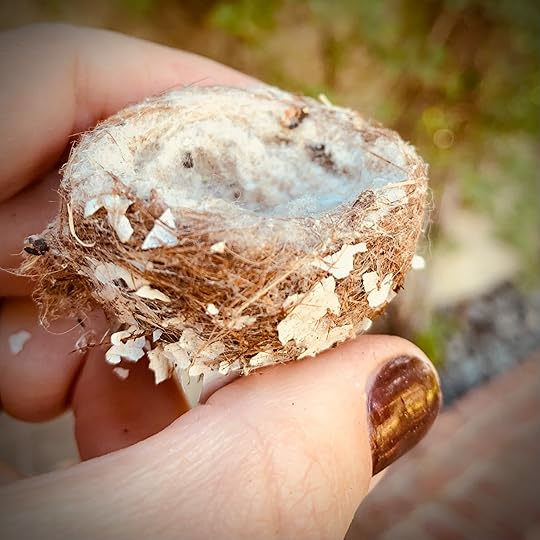
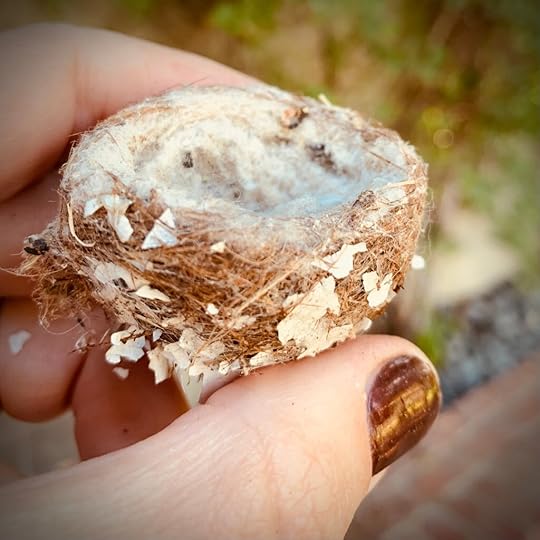
A few days ago, the hummingbird nest outside my window was finally vacated. I saw a little blur in the corner of my eye and looked up to catch the little green-chested bird dip low and then swoop up into the sky. The nest was empty. I waited a few days to go out and pull it down, just in case the chick might be coming back, but it never did.
But wait, you’re saying, I thought there were two chicks in that nest?
There were. About a week ago I noticed that I could only see one bird in the nest. Worried that one had been pushed out and was maybe floundering on the pavement I went out to check, but found nothing. So the way I figure it, one of two things happened.
The smaller, weaker chick was pushed from the nest prematurely and ended up a snack for one of my dogs or a local critter before I even noticed it was missing orThat other bird was just really precocious and took to flight days before it’s sibling got his or her act together and headed out.I’m choosing to believe the other bird was just a flying wunderkind and is out there somewhere impressing all the other baby hummingbirds with its mad skills.
I’ve read that the nests get stretched out as the babies grow, so they don’t reuse them, but I’m hoping momma bird will remember the spot and come back next spring to build another. It’s been my favorite distraction so far this year.
May 16, 2022
Answered: For How Long Should I Meditate?

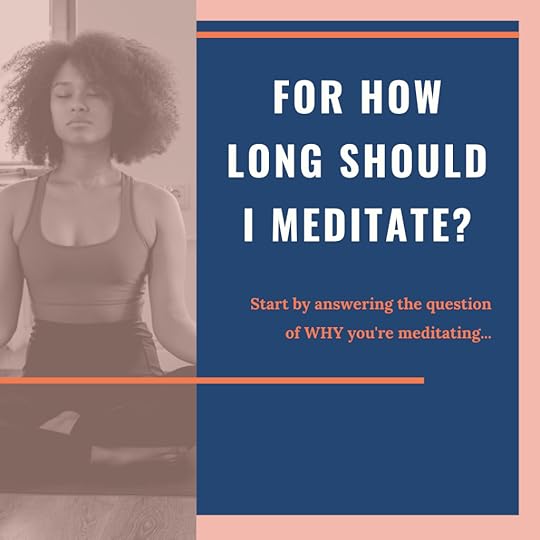
Do I have to meditate every day? For how long? Is five minutes enough? These are questions I get all the time. The reason this is such a pervasive question is that the answer is different for everyone. I’ll try to break it down.
Below I’ve listed out some thoughts on what would be best for you, based on why it is you’ve decided to practice meditation. (For this post, I won’t be talking at all about HOW to meditate. If you’re just getting started and are in need of some basic instruction, check out my meditations for writers on Insight Timer or join us at A Very Important Meeting.)
Okay, here goes…
You Need To FocusMost of the teaching I do falls under this heading. At A Very Important Meeting and through my coaching, I lead meditations to help writers focus their minds. Generally, I have found that 10 minutes is enough time to let go of all the other thoughts clamoring for attention and really bring the focus. Then, if you’ve set yourself up for success (meaning you put your writing in front of you before you closed your eyes to meditate) the transition to writing is seamless.
If you haven’t tried this yet, you should. I hear ALL THE TIME from first-timers who are shocked at how much writing they can get done in 45 minutes when they take 10 minutes to focus their minds first.
Focus In Times Of TroubleIf you’re looking to find some focus after something has knocked you off balance (say an argument with a boss or spouse), you will need more time. When we get upset, there are physiological changes that take place in our body. Adrenal glands are stimulated. Our heart rate, blood pressure, and breathing rate increase. We are primed for a fight or flight responses. Those things don’t go away simply because we decide we’re not going to be angry any more.
It takes about 20 minutes for our bodies to calm down AFTER we’ve decided to be calm. And that’s only if we’re really intentional about our efforts to be chill. So you decide to meditate. You sit quietly, notice the angry thoughts, let them go. You do this for what feels like a LONG time, and gradually (after about 20 minutes) you will start to notice a genuine feeling of calm as the adrenaline gets processed and your body settles.
Meditate for Better SleepIf you’re looking to sleep better, you might try scheduling a ten-minute sit before bed. Or if you wake up in the night and have trouble falling back to sleep, consider making yourself a cozy spot to crawl to where you have your phone queued up to one of Calm’s Sleep Stories. (I’m a big fan of Faith Adiele, who writes for Calm AND is one of our meeting leaders at A Very Important Meeting.)
Sleep meditations can be used on an as-needed basis, but keep in mind that one of the benefits of regular meditation is better sleep, so if you can make a habit of it in your daily life, you might find you don’t need that middle of the night meditation any more.
Improved Overall Well-BeingIf you’re looking to support your health over all, you’ll want to aim for consistency over duration. If you can carve out just 10 minutes a day, you will create for yourself a sort of shield against chronic stress. This, in turn helps support your sleep, cognitive abilities, immune system, digestive system, and so much more. 15 minutes is even better. Do as much as you can regularly carve out time for.
But even if you can’t carve out 10 minutes, think about where you might be able to quiet your mind for just a few minutes. I had one student who simply could NOT consistently carve out 10 minutes a day, so she started meditating while her coffee brewed. Instead of scrolling through social media, she rested her hands on the counter, closed her eyes and just breathed, listening to and smelling the coffee as it brewed. It was maybe three minutes, but after a few weeks, she noticed she was calmer and happier the rest of her day when she took the time.
EnlightenmentIf you’re looking for deep truths, you best settle in. I don’t usually go into the Buddhist aspects of mindfulness here on the blog (though I love to – drop questions below if you want to get into it), but if what you’re hoping to find is some deep understanding of the universe and yourself in it, you’re going to have to embrace both consistency and quality. Start with an hour a day.
Do some searching on Insight Timer to get started. Find yourself a teacher you like. Check out Ajahn Sona’s lessons on YouTube and listen to talks by Josh Korda of the Dharma Punx in NYC. Plan to sit extended retreats.
Find CommunityNo matter what your goal is with meditation, you will need a community. This is something that gets lost in the westernized version of mindfulness meditation. We love to do things all on our own, and meditation seems like just the kind of thing that should be done in isolation, but it’s not.
You will have questions. You will want to quit. You will learn things as you go that you can share with people who are likewise trying to find their way. Once again I will plug A Very Important Meeting as a great place for mindful writers (it really is a great group of people), but it doesn’t matter where you find your community so long as you find it.
Best of luck to you and, as always, feel free to leave questions or comments below.
May 14, 2022
Meditations For Writers


It occurred to me this morning that I never shared with you, dear readers, that I have recently set myself up with an account on Insight Timer where I’ve been steadily adding short meditations for writers.
Of course, if you can make it to A Very Important Meeting (AVIM), you can catch me live (and we can hang out after we get some writing done), but I know the schedule at AVIM doesn’t work for everyone. You can think of the Insight Timer library as April On Demand.
And of course, if you have questions about how mindfulness can help your writing, I love taking shop. Leave a question below or contact me in whatever way works best for you.
Happy writing.
May 13, 2022
Note To Self

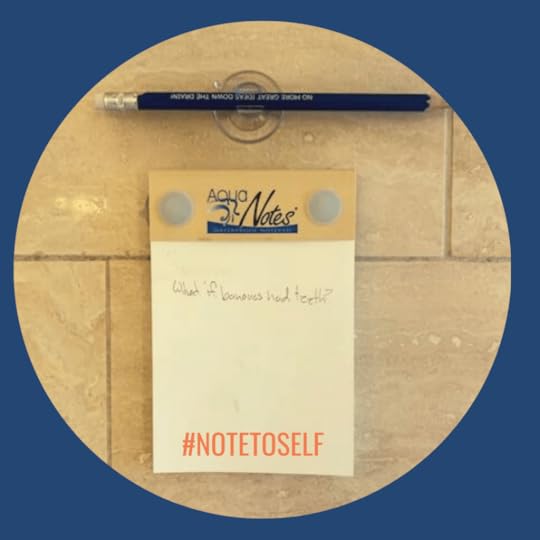
For my birthday last weekend, the kids got me this waterproof notepad for the shower. I love it, but I think the kids love it even more. This is the note I found waiting for me the next morning. In case you can’t read it, it says: “What if bananas had teeth?”
These are the important questions that will no longer be lost down the drain now that I (we) have a water proof notepad.
May 12, 2022
A Buddhist Limerick
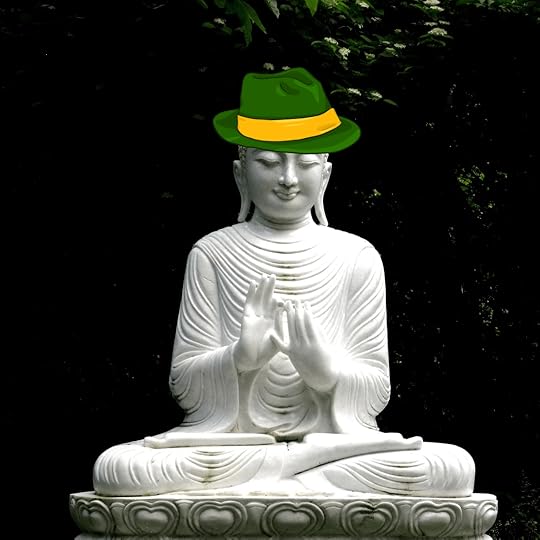

Today is National Limerick Day!
I’m not even a huge fan of limericks, but the fact that they have a whole day dedicated to them is so bizarre and wonderful, that you kind of have to take a moment to celebrate.
When I told my husband the news, he composed a limerick for me based on the Diamond Sutra. Because he’s a genius. The Diamond Sutra is a Buddhist religious text and one of the oldest existing books. There have been a lot of translations (some better than others, apparently), but in short, it explores the ephemeral nature of the world. Here’s a sample:
Just as, in the vast ethereal sphere, stars and darkness, light and mirage, dew, foam, lightning, and clouds emerge, become visible, and vanish again, like the features of a dream—so everything endowed with an individual shape is to be regarded.
As writing goes, it’s about as far from limerick as you can get, but my guy made it work:
A star at dawn, a bubble in a stream,
A flickering lamp, a phantom in a dream.
We see life this way
If we start the day
Committed to our mindful routine.
And there you have it. A Buddhist limerick for National Limerick Day.
May 11, 2022
Heartening Words


I wrote this quote on the wall in my office. I find it so heartening that a writer like Yeats worried about “stitching and unstitching” so that each line seems “a moment’s thought.” Deep as I am in the editing process, this idea is really resonating.
That’s all for today.
May 10, 2022
5 Ways for Writers to Ward Off Depression
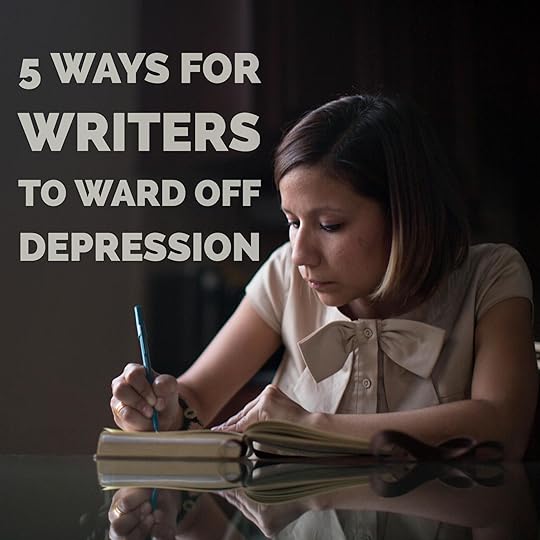

It’s Mental Health Awareness Month, which seems like a good time for real talk about writers and depression.
Back in 2017, I was at the BlogHer blogging conference, taking a turn through the main pavilion where all the vendors were pitching their latest and greatest in an attempt to get us bloggers to promote their goods to our readers. I was in the wrong place. Because, honestly, I’m not looking to sell tuna or face lotion to my readers. Even if the money was good (which it’s not) I just don’t write that kind of blog.
But then I came across a booth dedicated to mental health. They weren’t selling anything. They were simply there to spread the word that depression is real, and we need to be able to talk about it. To which I said…
Hell Yes, We DoThe fact that depression is real shouldn’t come as a shock to my fellow writers out there. In fact, when I approached the booth and told the woman there that my blog is for writers, she gave an emphatic nod and held her arm wide as if to welcome me into the booth. I told her how I have struggled with depression off and on for years. She told me how very common it is, especially for creatively minded people. We’re just special, I guess.
I’ve been thinking a lot about that conversation since then. While I am not currently struggling with depression, I’ve had some tough times in the past, and I’ve come to recognize a few of the warning signs. And since I try to be well rounded here in my discussions of what it is to be a writer, I thought I’d share a little of what I’ve learned about depression as it affects me personally, in the hopes that it might help someone else out there as much as any post about grammar or voice.
(Please keep in mind I am not an expert. If you’re feeling down, don’t wait. Talk to a professional, like, right now. If you don’t have or can’t afford a therapist, try the National Suicide Prevention Lifeline. Do what ever you need to do to be safe.)
For me, the biggest sign that depression is looming is a nagging desire to watch science fiction movies. That’s a little weird. I accept that, and I’ve come to understand it over the years. It’s escapism, a desire to fall into a world different from the one I’m actually living in.
This desire for escape, in turn, seems to fall into a larger category of craving that ticks up a notch when I’m off balance. When depression is knocking at the back of my brain I tend to want things. I decide I need a new pair of shoes. I want a martini or three. I want to go out to dinner. Recently, I find myself compelled to find some magic face lotion that will stop the formation of wrinkles.
But consuming shit only makes me feel more off balanced because it doesn’t solve anything, and I end up feeling bad for having spent money on things that aren’t books.
How I DealNow that I’m 40, and so much wiser for it, I’m better at recognizing my covetousness as a warning sign. When I catch myself thinking how it might be nice to open a bottle of wine and dig out my Firefly DVDs, there are a few things that help me feel more centered and less anxious.
Exercise. Cliché, I know. But even just a walk around the block helps sometimes. Jogging, swimming, yoga, even (for consenting adults) sex. It doesn’t matter what, just do something that gets your blood pumping.Meditate. Just sit quietly and count your breath for five minutes. Set a timer. Count the exhales up to 10, then start again at 1. If you lose count, that means you’re doing it right. Just start again at 1.Find someone to interact with IN PERSON. Humans need other people. Looking into someone’s eyes is very stabilizing. It’s a proven fact. If you can’t find someone, go to your local bookstore and ask the sales clerk what you should read. Just find a person to connect with for a few minutes.Use skillful distraction. A therapist of mine introduced me to this idea. He said that if you’re feeling all worked up and you don’t know how to deal, go ahead and watch an episode of StarTrek (I highly recommend Next Generation, Episode 25: “The Inner Light”). It can be a kindness to allow yourself that. Just don’t let one episode become ten. Watch one, then make a healthy choice like going for a walk or meeting a friend for coffee.Drink something not booze. Alcohol always seems like a good idea, but biochemically speaking it increases our levels of anxiety and messes up our sleep. Devise some sort of mocktail that can step in. Personally I like bubbly water with lemon. If I’m really feeling anxious, I use it to wash down a couple capsules of Kava Kava (which is very soothing, but apparently hard on the liver, so I don’t make a habit of it).I also have a therapist. We talk on the regular, and I find it really helpful, even when she does that therapist thing where she doesn’t actually offer advice, but just asks “how does that make you feel?” which I always find really annoying in the moment, but then, after the fact, I find myself feeling much calmer for having talked out whatever it was that had a choke-hold on my heart.
I would love to hear from the other creative types out there – have you struggled with depression? How did you crawl your way out? How do deal when it comes knocking? Do you have any tricks you would add to the list?
May 9, 2022
History of the Haiku
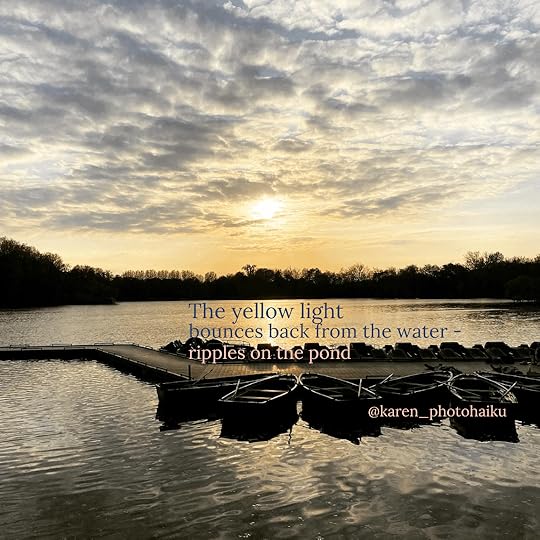
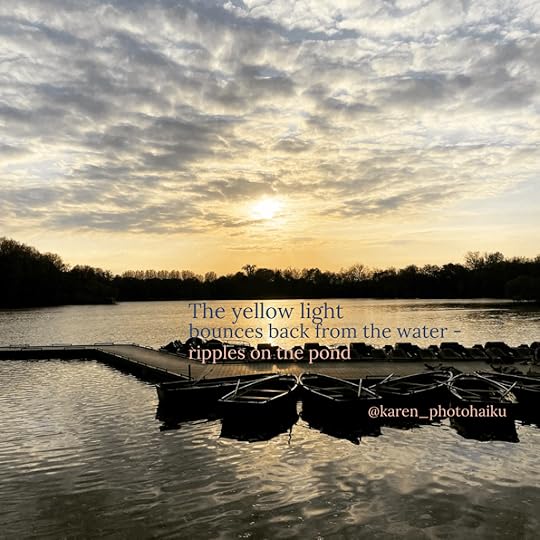 photo and haiku by @karen_photohaiku
photo and haiku by @karen_photohaikuRecently, while down a research rabbit hole, I found myself learning about the history of haiku.
They were part of the curriculum back when I was a kid, and I’ve always enjoyed tinkering around with them, sometimes writing a few silly lines in a birthday card or whatnot, but I never knew much about them as an art form. Here’s what I learned down the rabbit hole:
What we know as a haiku (the 3-line poem with the 5-7-5 syllable rule) became a thing in the 17th century, but before that, we’re talking WAY back in the 13th century, the haiku was just the opening phrase of a much longer, oral poem called a renga, which means “linked poem.”
Two poets (or poets working in two teams) composed the renga. The first poet would draft the 3-line, 5-7-5 bit and the other poet (or other team) would finish it off with two 7-syllable lines. Here’s an example:
Snow yet remaining
The mountain slopes are misty –
An evening in spring.
Far away the water flows
Past the plum-scented village.
The two poets/teams would pass it back and forth, adding three lines, then two, until the poems were hundreds of lines long.
The first stanza was called the Hokku. (If you want to geek out a little there are terms for all of the parts of renga, and rules for the challenge of creating them.)
Then, in the 17th century, there was apparently a backlash against long poems (the kids decided they were simply not cool anymore). That was when poets began dropping the long back and forth, opting instead to go with just the first stanza, which became known as the haiku in the late 19th century.
Now you know.
May 6, 2022
Yesterday Me

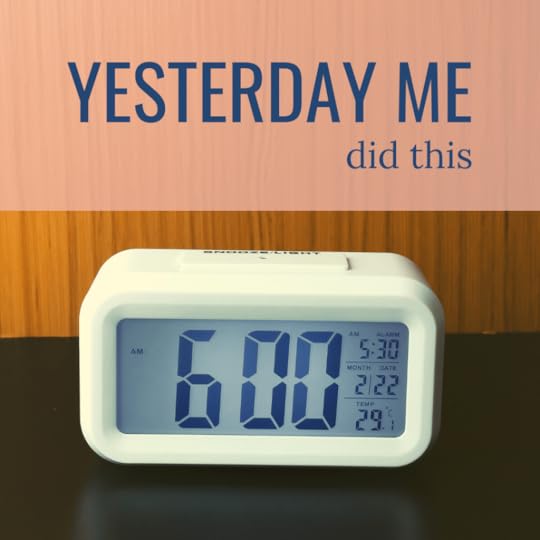
When I was in college, and I was staying up way too late on a school night, I used to have a little exchange that would happen in my head. I would think about tomorrow me and consider whether she was going to be able to handle her day if I stayed up partying. I almost always landed on some version of “ah, she’s tough, she can take it.”
Then, when my alarm went off the next morning, I’d curse yesterday me for being such a selfish bitch. Yesterday me used to make things so hard on today me.
I was remembering this last night as I did the dishes before going to bed. I don’t know when exactly it happened, but yesterday me is so much nicer than she used to be. She is downright considerate.
I think it’s because yesterday me knows (and I use the present tense here because I AM tomorrow’s yesterday me, always) that I have things I actually really want to accomplish today. With school, I always felt like I was going through the motions. I didn’t really want to be there, but if I was there I wanted to do well.
Anyway. Done with that. And mornings are so much nicer.
May 5, 2022
Favorite Writing Snack For Editing

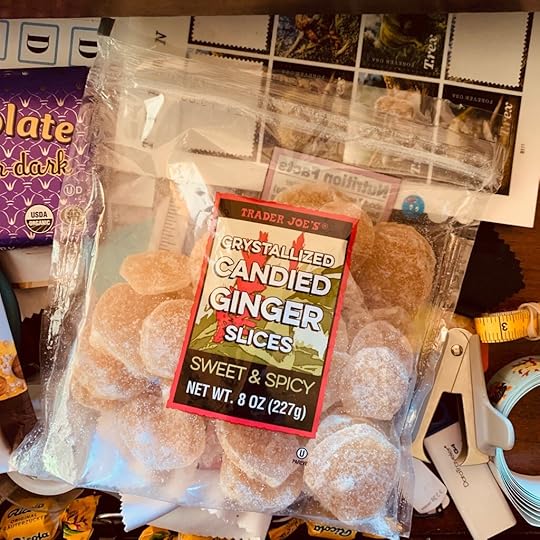
I have different snacks I turn to for different phases of my writing. There’s almost always chocolate in my desk drawer and I like to nibble on bars while I work on first drafts.
Any time I’m getting or reviewing feedback I need cookies. Like, a bin of cookies, usually ginger snaps from Trader Joe’s or a package of Oreos (no you can’t have any).
For edits, especially difficult last mile stuff, my go-to is candied ginger. I’ve been going through a bag of these every few days lately. They’re sweet at first, but then the spice of the ginger kicks in and if I mindlessly eat too many my tongue starts burnt which slows me down a little (always a good thing when you’re stuffing your face with candy). Also, the kids think I’m crazy for liking it so they never pilfer my stash. It’s the perfect sweet.
Do you have a particular food you munch on while you’re writing?



